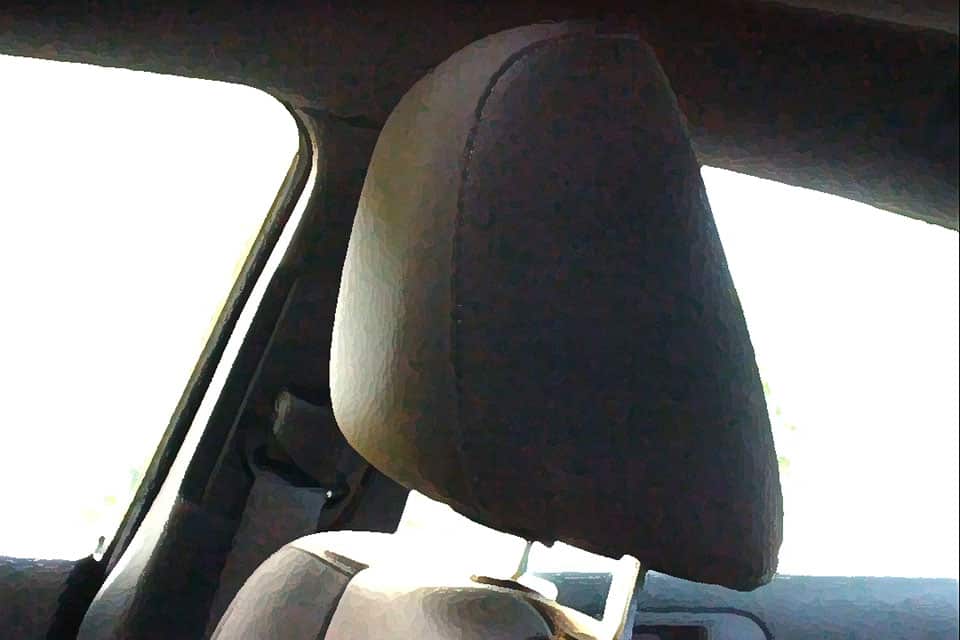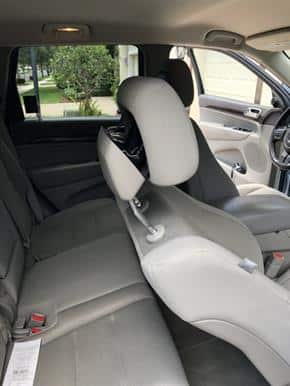Active Head Restraints Deploy Without Warning

In a rear-end collision, active head restraints push forward to reduce the amount of space an occupant's head can move. It's sort of like an airbag for the back of your head (minus the bag part).
Recently, Jeep owners have been reporting that their active head restraints (AHR) are deploying without any collision. And as you can imagine it can be quite startling to be smacked in the back of your head by your seat as you try to navigate traffic.
Inadvertent Head Restraint Deployments ∞
Unlike most modern issues in your car, this is not a sensor failure, electrical glitch, or poorly written software. This is a cheap part breaking into pieces and wreaking havoc, you know – just like the good ole' days.

FCA is facing heat for using a cheap plastic bracket to secure the pin that holds the AHR in place. The plastic is busting apart under the prolonged tension, releasing the pin and deploying the AHR into unsuspecting heads.
Resetting an AHR is possible, if it isn't broken ∞
FCA has been known to blame the whole ordeal on poor maintenance which is one of the more ludicrous things we've heard. Is everyone keeping up on their recommended head restraint maintenance? No? Of course you're not because there's no such thing.
FCA also points out that the AHR can be reset by an owner. And yeah, unlike an airbag it is possible. That is, if the plastic inside hasn't shattered into pieces.
Owners who have had to repair or replace their AHR say it costs upwards of $800.
Class-action lawsuit filed in Florida ∞
In January of 2019, a proposed class-action was filed in Florida blaming FCA for using defective plastic brackets to hold the AHR in place and making owners pay to replace them, even under warranty.
The lawsuit specifically mentions the Dodge Avenger and Jeep Cherokee as vehicles which see that bracket failure.
The allegedly defective piece of plastic holds a short metal rod that is latched into two metal hooks located on the back of the headrest. Those hooks are attached to a sensor that triggers the hooks on the front and back of the headrest when a crash occurs._
The whole system is in prolonged tension, and the plastic simply can’t handle the stress over time. It also doesn’t show any outward signs of trouble before breaking.
AHR Systems Have Been Recalled for Module Problems Before ∞
This isn’t the first time FCA’s AHR has been in the news. Back in 2013, the Liberty was part of a head restraint recall for 500,000 vehicles due to _ faulty microcontrollers … that could cause the system to fail._
In 2017 the Liberty was recalled again after an internal investigation revealed the occupant restraint control modules can degrade over time.
Neither of these recalls were serious. In the same way a broken escalator just becomes a set of stairs, a busted module just removed the active part and turned them into a normal set of head restraints until repairs could be made.
Lawsuits Regarding This Problem
Lawsuits about this problem have already been filed in court. Many times these are class-action suits that look to cover a group of owners in a particular area. Click on the lawsuit for more information and to see if you're eligible to receive any potential settlements.
Motion to dismiss Nuwer, et al., v. FCA US LLC, et al.
Motion to dismiss
According to the automaker, the Ram C/V owner who says his Chrysler headrest deployed can't bring his Arizona Consumer Fraud Act claim because he waited too long, making his claim time-barred. Chrysler argues a fraud claim must be brought within one year of when the cause of action accrues.
Case Filed
A Chrysler active headrest lawsuit alleges occupants are suddenly hit in their heads because the head restraints inadvertently deploy without crash impacts.
Generations Where This Problem Has Been Reported
This problem has popped up in the following Jeep generations.
Most years within a generation share the same parts and manufacturing process. You can also expect them to share the same problems. So while it may not be a problem in every year yet, it's worth looking out for.
5th Generation Cherokee
- Years
- 2014–2021
- Reliability
- 16th out of 18
- PainRank™
- 29.44
- Complaints
- 1721
2nd Generation Liberty
- Years
- 2008–2012
- Reliability
- 15th out of 18
- PainRank™
- 26.83
- Complaints
- 393
Further Reading
A timeline of stories related to this problem. We try to boil these stories down to the most important bits so you can quickly see where things stand. Interested in getting these stories in an email? Signup for free email alerts for your vehicle over at CarComplaints.com.
Fiat-Chrysler (FCA) is recalling 470,000 cars with active head restraints after an internal investigation revealed there were problems with the occupant restraint control modules that can degrade.
The investigation came after the National Highway Traffic Safety Administration (NHTSA) inquired about AHR complaints in the 2012 Jeep Liberty SUVs and 2012-2013 Chrysler 200 and Dodge Avenger cars.
The Liberty was involved in another AHR recall back in 2013.
keep reading article "2012 Liberty’s Active Head Restraint Recalled"The 2011-2013 Liberty has been recalled because a faulty microcontroller in the active head restraints could cause the system to fail.
The silver lining? If an active head restraint fails, it just becomes an inactive head restraint until you can get your module replaced or software updated.
keep reading article "Active Head Restraints Recalled"